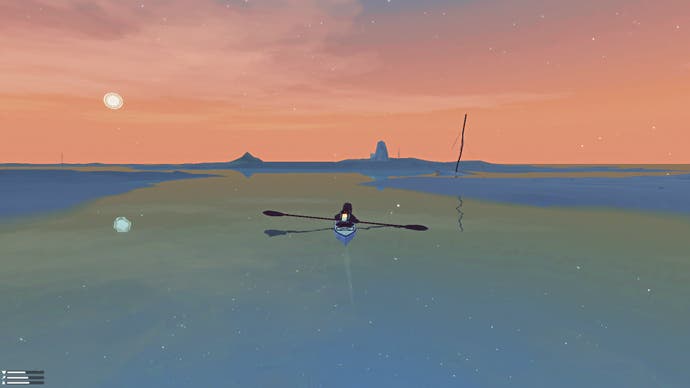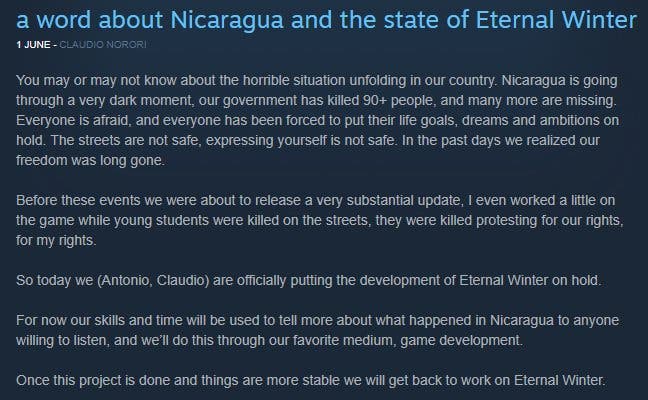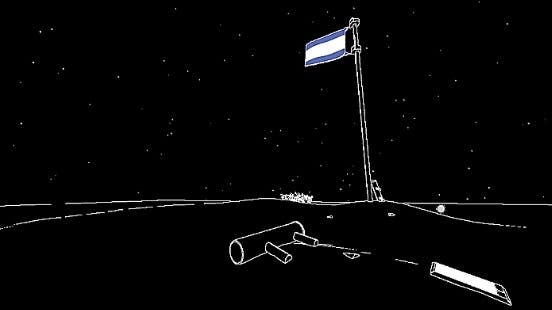The game developers telling their story of Nicaragua's deadly crackdown on protesters
“We grew tired of corruption, of repression...”
On the first of June, Claudio Norori and Antonio Vargas announced that they were halting development of their early access game Eternal Winter. "You may or may not know about the horrible situation unfolding in our country," Norori wrote. "Nicaragua is going through a very dark moment."
Since April, demonstrations have sprung up throughout the country. Over 100 people have been killed: mainly protesters, many of them students.
"Many people think that we are protesting some social security reform, but that was just the spark," Norori explains to me. "We grew tired of corruption, of repression, we grew tired of having to watch our mouth when we talk about politics and the ways those bastards are killing the future of our country. For many years, Daniel Ortega's government has been using "socialism" propaganda to hide what everyone already knows: they are nothing but a bloodthirsty dictatorship. We are protesting to regain our freedom."
Ortega first took power in 1979, following a revolution that ousted a hereditary dictatorship, and he was elected by popular vote five years later. His rule has long been marred by accusations of human rights abuses. The Inter-American Commission on Human Rights uncovered evidence of mass executions following the revolution, as well as urging fair trials and freedom of expression. In 1983 they condemned forced resettlements and killings of indigenous people. On the other hand, Ortega's government was not the only one accused of atrocities: in 1986 the International Court of Justice ruled that the US's funding, arming, and training of counter-revolutionary rebels in the country, who ended up killing tens of thousands of people, broke international law. (The US later blocked the United Nations Security Council from enforcing the judgement, meaning Nicaragua received no compensation.)
Ortega lost the 1990 presidential election, but was elected once again in 2006 and began to move to shore up his power. In the past 12 years, Nicaraguan courts have enacted constitutional reforms that gave him sole power over key appointments in the army and police, and abolished term limits. In 2017 Ortega appointed Rosario Murillo, his wife, to be vice president, sparking fears that the country's politics would return to something similar to its previous dynastic dictatorship.

There have been several protests since 2013, with Nicaraguans taking to the streets for pension reform, freedom of the press, and indigenous rights. Many have been met with state violence. Yet nothing had previously come close to the events of the last few months.
In April, protesters gathered once again, first to condemn the government's perceived failings in dealing with a forest fire on the Indio Maiz Biological Reserve. The reserve is home to indigenous people who had previously protested attempts to build a canal there, and many demonstrators believed that the government had a vested interest in allowing the forest to burn.
Two days later, Ortega decreed social security reforms that would have increased taxes and decreased pensions. Protesting intensified, with mainly students and the elderly marching. But as Norori says, this was only the spark. Demonstrations continued despite Ortega reversing the decree, and despite government forces using repressive tactics in an attempt to quell the discontent.
Amnesty International has accused the national police of firing live ammunition at peaceful protesters, as well as using other pro-government armed groups to commit violence. Norori's experiences corroborate this: "It is not safe to leave your house, paramilitary groups sponsored by the government (sometimes police officers that just leave their uniforms at home) are constantly roaming the streets looking for ways to spread fear, and this usually means murder. Police forces use live ammunition every day."
Considering the circumstances, he and Eternal Winter co-creator Vargas understandably didn't feel able to continue development. "My life has been reigned by fear and anxiety," Norori says. "Constant nightmares, uncertainty about my future, putting on hold my biggest project, fearing for the lives and safety of those I love. And this is nothing, absolutely nothing, compared to what some Nicaraguans are going through. Some mothers are burying their 15 year old children because they went out and protested for our rights."

And yet he is still working. "Nicaraguan writers, creators, illustrators, musicians, designers are all focused on making things that inspire the country to keep going and also tell the world about our situation. I am a game developer, and I must use my skills to inform anyone willing to listen about what is going on in my country."
He and Vargas are in the process of making a point and click experience called 19 Nights in Nicaragua. "The player will be able to explore 19 scenes that will be based on the events happening in Nicaragua, and by clicking on each object they will learn more about each sometimes inspiring and sometimes horrific scenario," he tells me.
Despite everything, Norori emphasised the hope he felt: "Everyone is helping in any way they can. Some are brave enough to risk their lives on the front lines against this tyranny, medical students provide first aid to anyone injured while protesting, some use social media to keep the world informed, some go out and donate food, medicine and other valuables to the cause. Nicaraguans are tough and kind."
19 Nights will aim to showcase this resilience as well as the government repression. "We will not only tell about the horrors we are witnessing, but also about how a small country in Central America was brave enough to go out on the streets and face armed murderers while having nothing but the truth on their side." The pair want to release the game "before August," and it will be free on itch.io and Steam.
I ask Norori what his hopes are for the future of his country. His answer is a single word: "Democracy."

